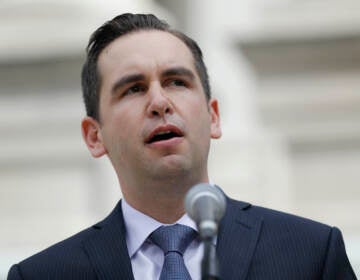Murphy details plan for major overhaul of N.J. ethics rules
New Jersey Gov. Phil Murphy announced five legislative proposals Wednesday that would drastically overhaul the state’s ethics rules for government officials.

Inside the New Jersey State House building in Trenton. (Julio Cortez/AP Photo)
New Jersey Gov. Phil Murphy announced five legislative proposals Wednesday that would drastically overhaul the state’s ethics rules for government officials, in what he called the first comprehensive reform in a decade.
“These proposals will shine light into the dark corners of our politics and re-instill faith, as best we can, that those elected to serve are there to serve the people, all of the people, not the special [interests] or their own interests,” Murphy said.
Although Murphy said he had Democratic and Republican sponsors for his proposals, it is unclear whether the Democratic leaders in the legislature — Senate President Steve Sweeney, D-Gloucester and Assembly Speaker Craig Coughlin, D-Middlesex — would support the ideas.
Among the proposals are a requirement that all members of the executive and legislative branches earning over $100,000 per year fill out detailed financial disclosure forms, and that high-level legislative staff seek permission from the Joint Legislative Committee on Ethical Standards to earn outside income.
Murphy also floated the idea of increasing the “cooling off” period that delays how long former government officials must wait to register as lobbyists from one to two years, and backed a Sweeney-supported ban on “shadow lobbying,” which occurs when someone influences government decisions without registering as a lobbyist.
C.J. Griffin, a partner at the law firm Pashman Stein Walder Hayden, who works on government transparency issues, praised another one of Murphy’s proposals that would eliminate the broad exemptions enjoyed by the legislature under the Open Public Records Act.
“I think people want to see the everyday conversations about issues and who has influence,” Griffin said. “There are ways to disclose communications without really violating privacy.”
Another proposal would require legislation to be posted on the legislature’s website for 72 hours before a vote.
Dena Mottola Jaborska, associate director of the advocacy group New Jersey Citizen Action, said an overhaul to ethics rules in Trenton was long overdue.
“If you’re a regular person or an activist who doesn’t spend all their time every day working on public policy change, it’s very difficult to figure out how to influence the process. It’s even difficult to figure out how the process unfolds,” Mottola Jaborska said.
“Doing these simple changes that the governor has laid out will allow regular people to understand how their decision-makers are making decisions.”
WHYY is your source for fact-based, in-depth journalism and information. As a nonprofit organization, we rely on financial support from readers like you. Please give today.




